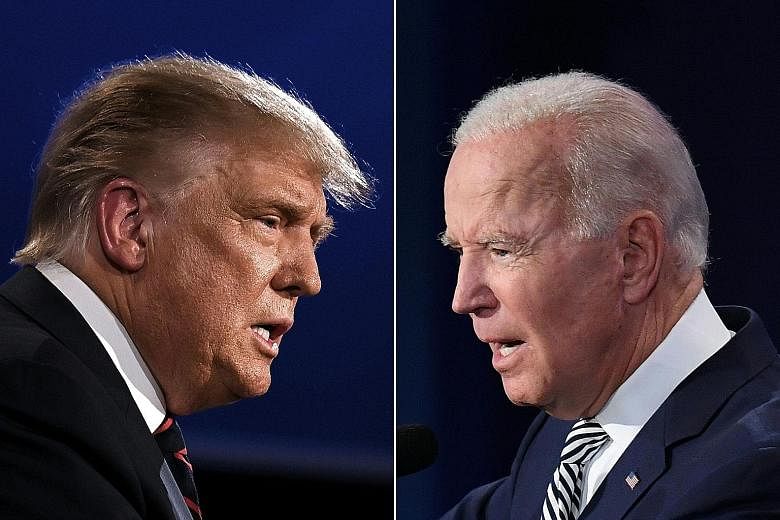The United States has a new president-elect but the old divisions remain. It may be even more divided now after such a close and ugly election.
For many of us watching from afar, it was not easy to comprehend what was taking place.
The US is looking more and more like a distant friend separated from the rest for so long, it is now unrecognisable.
How to make sense of the deep class and racial divisions in the country that explode in the streets every now and then, and the destructive political partisanship that makes these problems impossible to resolve?
If this is American democracy, there should be social distancing rules to keep it away from the rest of the world.
Before, you could simply shrug your shoulders and say you really do not understand US society and that perhaps it has a different way of tackling its issues.
But then the Covid-19 pandemic struck, a common enemy you knew closely and whose spread you knew how to control.
That was when the US became incomprehensible to me, after mask-wearing became a political issue, and the President openly contradicted the advice of health officials.
But the world, including Singapore, cannot turn its back on the US - it needs to understand it because the US has an outsized role in determining critical issues that matter to all of us, including its relationship with China, climate change and the pandemic.
President-elect Joe Biden will be a different leader from President Donald Trump, but he will inherit the same divided people torn apart by the same divisive issues.
As many analysts have noted, the outgoing President was not the cause of these deep divisions but its symptom. He may be going but another leader will emerge from the people who supported his cause, which if you go by the votes obtained, amounted to no less than 71 million.
That's another hard-to-comprehend part of the US.
Most Singaporeans I spoke to were rooting for Mr Biden not because they liked his views but they just wanted President Trump out.
They might not understand enough the policy differences between the two candidates but had a big problem with the moral character of the President - he was a bully, played fast and loose with the facts, especially over the pandemic, and had no respect for women and minorities.
His words and actions did not accord with their sense of decency and morality which they expect of a leader, especially of the world's greatest superpower and a once leading light of liberal democracy.
In contrast, Mr Biden, according to several reports, won not because of policy but who he was as a person.
His was a lifelong service in politics - quite a journey from one of the youngest senators at the time when he was only 29 years old to now the oldest elected president at 77.
But it was marred by personal tragedy when a car accident killed his young wife and one-year-old daughter in 1972, and he was left alone to raise his two sons.
Tragically, he would lose one of them, Beau, to brain cancer in 2015.
Grief-stricken by the loss, he declared he would not run for office after then President Barack Obama's term ended in 2016.
But he changed his mind following the Trump years, and would later reveal that it was his dying son's wish for his father to continue serving the country.
Despite the two candidates being so different in character, Mr Biden did not deliver the knockout blow that many had expected.
Why wasn't character the decisive factor in the contest, especially when one candidate appears to be so lacking in it?
There might be many reasons and the Trump campaign did try to hammer away at the alleged corruption of Mr Biden's son, Hunter, over business dealings in Ukraine.
Perhaps enough Americans believe there wasn't that much daylight between the two as far as moral scruples go.
But I believe the more important reason is that when people are divided and feel so strongly about issues that they demonise their opponent as a result, they will overlook their own candidate's moral flaws.
Winning at all costs becomes the only objective because you are so afraid of losing.
Listening to what both sides say about each other, it is clear the US has reached this point.
The feelings in both camps are intense because their differences are not over policy but identity: What sort of America do you want? Open to immigrants because diversity is to be nurtured and celebrated? Or not so open because you want to preserve white traditional values? More power to individuals and local community actors or to big government in Washington?
This culture war has been going on for years now and will intensify unless leaders of strong moral character, who are able to look beyond their narrow sectarian interests, emerge.
The good news is that at moments of great crisis, people tend to look for such unifying figures to lead them out of peril.
Perhaps - and this might be the most generous interpretation of the election result - enough Americans did do so to tip the scales for Mr Biden.
There is a lesson for Singapore.
Politics here is likely to become more competitive, and elections more contentious.
There is nothing wrong with this, and it is a natural outcome in a maturing democracy.
Out of the contestation of ideas, more representative solutions might be found that work for the country.
But if it becomes too divisive because the issues are over identity and culture, the outcome might not be so different from what has happened in the US.
For Singapore, identity issues could be over race, language, immigration or class.
Never say never - that it will not happen here.
When people are divided over identity, they will follow a leader who fights for their cause, never mind his moral character.
It can happen to both the ruling party and the opposition. Neither is immune from these tendencies.
A government in power that is afraid it might lose an election can easily sow discord and distrust among the people to preserve its hold on power.
A silver-tongued opposition leader might do the same thing to discredit the government of the day.
The best way to prevent it from happening is for the people to develop the wherewithal to know and understand what is right for the country, to think critically for themselves and not to follow others blindly.
Strengthening civil society is one way of achieving this because it forges a greater sense of community among the people.
Most critically, to develop a political culture which places the highest premium on leaders with moral character, conviction and commitment.
Singapore was fortunate that its founding leaders were men with these qualities who led by example and were seen as one with the people, not apart and separated.
It has often been said they were pragmatists and interested in only what worked and delivered results, and that the country's progress was a result of that pragmatism.
I believe this is mistaken.
They might have been practical people, but they were driven first and foremost by what they believed in, which was to build a fair and just society, committed to making Singapore succeed as an independent nation.
Leaders must have strong character shaped by a moral purpose to serve the people.
In a divided world, these qualities matter more than ever.
• The writer is also senior fellow at the S. Rajaratnam School of International Studies, Nanyang Technological University


